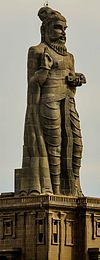History of translations
The first translation of the Kural text into French was made by an unknown author, which was titled Kural de Tiruvalluvar and found a place in the Bibliothèque nationale de France of France in 1767. [1] [2] However, it is E. S. Ariel who is generally credited with bringing the Kural text to the French world. Ariel, who considered the Kural as one of the highest and purest expressions of human thought, [3] translated fragments of the first two divisions of the work, viz. aram (virtue) and porul (wealth) in 1848. Since then several translations appeared in French, chief among which are those by Pierre-Eugène Lamairesse (1867), G. Fontaineu de Barrigue (1889), Dumast, Louis Jacolliot, and Alain Daniélou (1942). [2] Gnanou Diagou translated the entire work in 1942, which was first published in Pondicherry. [4] Few other translations were published in the 20th century, including M. Sangeelee (1988) and François Gros (1992). In 2007, Rama Valayden published a translation in Port-Louis, Mauritius. [5]
This page is based on this
Wikipedia article Text is available under the
CC BY-SA 4.0 license; additional terms may apply.
Images, videos and audio are available under their respective licenses.

